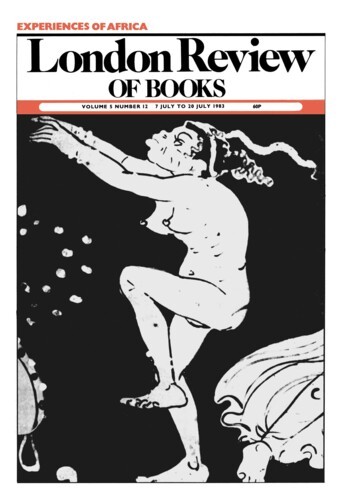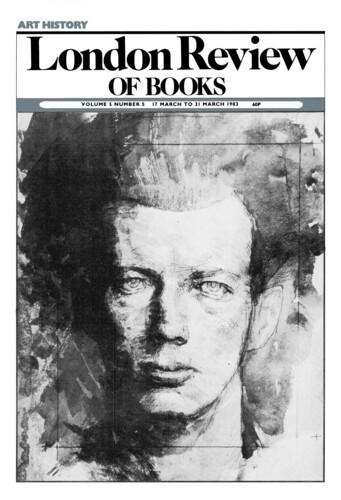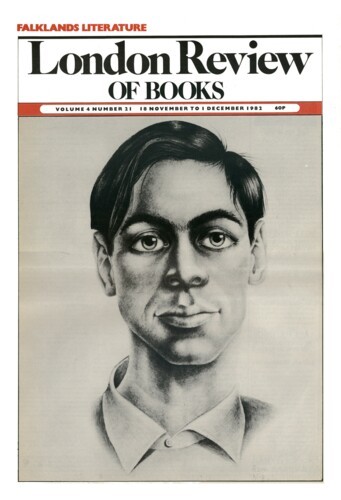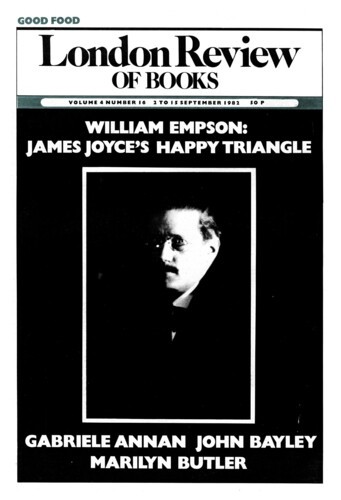Marilyn Butler
Marilyn Butler, who died in 2014, was King Edward VII Professor of English Literature at Cambridge and rector of Exeter College, Oxford, the first woman to head what had been a men’s college. Her books include Jane Austen and the War of Ideas and Romantics, Rebels and Reactionaries: English Literature and Its Background, 1760-1830 as well as a biography of Maria Edgeworth, whose works she also edited.
Three feet on the ground
Marilyn Butler, 7 July 1983
One evening, declares Jonathan Wordsworth as he begins his new critical book, a poet happened to be walking along a road, when the peasant who was with him pointed out a striking sight:
Julia Caesar
Marilyn Butler, 17 March 1983
The Prince and the Wild Geese is a story of 1832 told in words and pictures, the words almost all Brigid Brophy’s, the pictures by Prince Grégoire Gagarin, artist son of the Russian ambassador in Rome after the end of the Napoleonic Wars. Graceful and witty, Gagarin’s drawings portray his social world much as Pope in ‘The Rape of the Lock’ portrayed his, in a spirit of satire touched with complicity. Gagarin’s Rome, like Pope’s London, emerges the more definitively from seeming, at the outset, only the backdrop to a story of thwarted passion. The drawings illustrate a simple tale: how Gagarin is obsessed with an Irish girl, Julia Taaffe, how he meets her in Rome’s villas, squares and esplanades, and how in the end she refuses him. Since social convention bars him from speaking or writing seriously of his passion to the object of it, he translates himself, Julia and Rome into fantasy, a more eloquent medium than their polite foreigners’ French.
Success
Marilyn Butler, 18 November 1982
Byron is one of the first international successes of the literature industry. From the Renaissance on, sculptors and painters could get into the big money in any of the richer economies of Europe; throughout the 18th century, musicians poured out of Germany, Austria and Italy. But writers, because of the language barrier, had to wait for a large leisured readership, as well as for the late 18th-century boom in the printed word, which included among its manifestations the rise of the literary review.
‘New Pelican Guide’
2 September 1982
Pieces about Marilyn Butler in the LRB
Talk about doing
Frank Kermode, 26 October 1989
Anyone presuming to review works of modern literary theory must expect to be depressed by an encounter with large quantities of deformed prose. The great ones began it, and aspiring theorists...
The Sage of Polygon Road
Claire Tomalin, 28 September 1989
Mary who? was the person I mostly seemed to be dealing with in the early Seventies, when I wrote a biography of the extraordinary woman whose works have now been collected for the first time,...
Fiery Participles
D.A.N. Jones, 6 September 1984
Hazlitt is sometimes rather like Walt Whitman, democratic, containing multitudes, yet happy with solitary self-communion. In a pleasant essay called ‘A Sun-Bath – Nakedness’,...
Citizens
Christopher Ricks, 19 November 1981
‘Authors are not the solitaries of the Romantic myth, but citizens.’ The spirit of Marilyn Butler’s excellent book on the Romantics is itself that of citizenship: of belonging...
The Case for Negative Thinking
V.S. Pritchett, 20 March 1980
One of the pleasures of reading Peacock in the Thirties, when I first read him, was that he was without acrimony. He enabled us to relive the great battles of ideas in the 19th century without an...
Read anywhere with the London Review of Books app, available now from the App Store for Apple devices, Google Play for Android devices and Amazon for your Kindle Fire.
Sign up to our newsletter
For highlights from the latest issue, our archive and the blog, as well as news, events and exclusive promotions.




